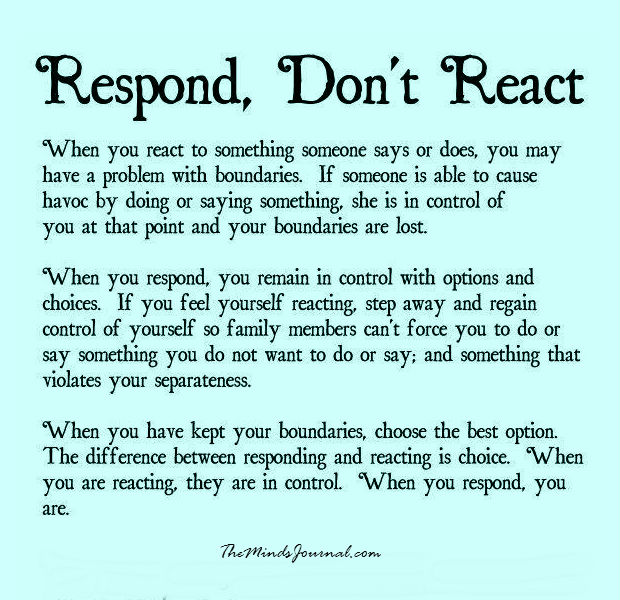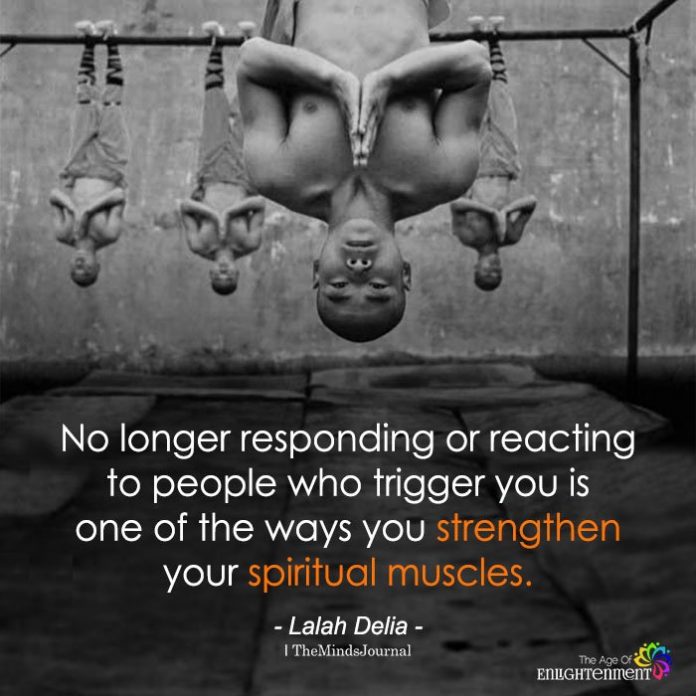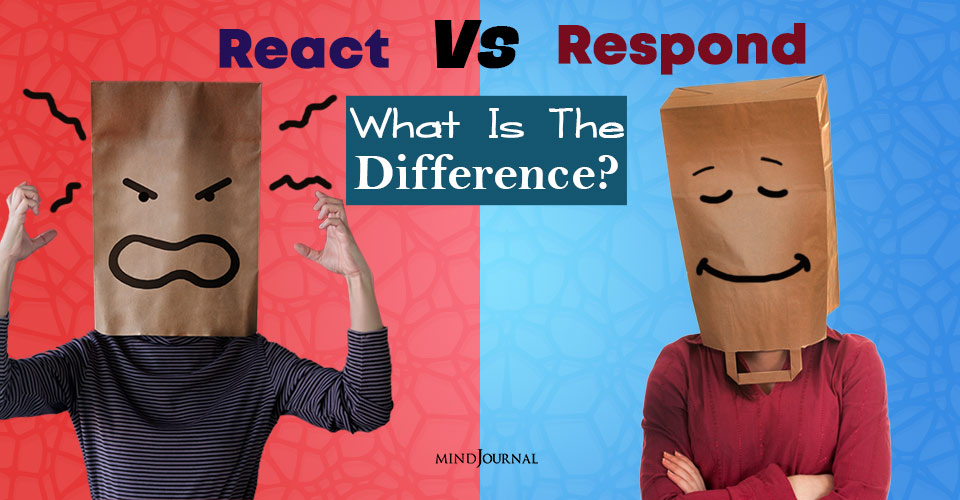React and Respond: Ever wondered how reacting and responding can alter your life? Understanding the difference between the two can be a helpful skill, especially in difficulties. When you react, it can be aggressive or emotionally driven, but when you take a moment and respond to situations, it resolves issues and allows you to be mindful.
Whether you react or respond makes a big difference in life’s outcomes.
KEY POINTS:
- Semantics are important because words act as a powerful lens through which we perceive, interpret, and analyze our world.
- Reactions driven by our amygdala are grounded in our survival instinct where there is no time to deliberate.
- What worked on the Serengeti doesn’t work in the 21st century, where the pre-frontal cortex is better suited for responses that work.

The Difference Between Reacting and Responding
Over my decades-long history as a blogger, author, public speaker, and consultant, I have come to appreciate the power of words. I often hear that “it’s just a semantic difference” when discussing terms that have the same meaning. Yet, I have found that the differences between words are usually much more than semantic.
Words act as a powerful lens through which we perceive, interpret, and analyze our world. Words also label and define our experiences; what we think, the emotions we feel, the actions we take, and the interactions we have with others. As a result, when speaking or writing, it’s essential to use highly descriptive words of what we want to communicate.

Two essential words in our lexicon are react and respond. At first blush, they seem to have the same meaning, and my thesaurus indicates that each is a synonym for the other. Yet, through my work, I have come to see a profound difference in the meaning of these two words, particularly when faced with difficult situations. Each of these words produces different reactions/responses to life experiences, particularly stressful ones.
Would you rather react or respond to a situation?
The Latin root of react is “back, to do, perform.” The key takeaway is that you are taking action back at someone or something. In contrast, the Latin root of respond is “back, answer.” The key takeaway is that you are answering back to someone or something, usually in words.

Related: How To Stop Getting Defensive When Triggered: 5 Tips
Humans are wired through millions of years of evolution to react in certain ways to situations that present themselves. This focus on reaction is grounded in our survival instinct and the understanding that on the Serengeti 250,000 years ago, when we officially became homo sapiens, there was no time to ponder and deliberate before taking action because, during that time, our ancestors would likely be killed.
We were still guided predominantly by our amygdala, and our emerging cerebral cortex had little need to be engaged. Our amygdala perceived a threat to our survival and triggered our fight-or-flight reaction (not response!), which increased our chances of living another day, passing on our genes, and propagating our species.
These same instinctive and visceral reactions arise when confronted by modern-day situations in which our physical survival isn’t threatened, but rather by what I call psychological survival, which involves threats to our self-identity (e.g., how we describe ourselves), self-esteem (e.g., how we evaluate ourselves), and our goals (e.g., educational, career, and financial aspirations).
Related: How To Respond Gracefully To Destructive Criticism: 6 Tips
Present-day survival instincts, what we would commonly refer to as our “baggage,” include perfectionism, fear of failure, need for control, need to please, among other strategies that protect our psychological survival.
As we often learn the hard way, what worked on the Serengeti so long ago doesn’t work in most situations in the 21st century. Experiences we were faced with then hold little resemblance to those we face now. Herein lies the critical distinction in how these two words are used and, in turn, impact us.
Due to the complexities of life today, reacting based on our primitive instincts or baggage rarely leads to positive outcomes.
For example, if a colleague gets a promotion that you had expected to reach, you will naturally react with disappointment, hurt, and potentially anger. You might let that anger overwhelm you, resulting in your storming into your boss’s office and threatening him or her, a reaction that I’m sure you agree would not be helpful to your survival, whether physical or psychological.
Related: 5 Signs That Say You Need Emotional Healing
Thankfully, a part of our evolution has involved the emergence of the cerebral cortex and, more specifically, our prefrontal cortex, which governs what has become widely known as our “executive functioning,” which is associated with memory, analysis, planning, problem-solving, weighing risks and rewards, considering short-term and long-term costs and benefits, and decision making.
Referring back to the Latin root of respond, in answering in words, we are activating our cerebral cortex and thus using our evolved brain to deal with the complicated and far more common challenges we face in the 21st century. We can engage in deliberate thinking and thoughtful decision-making, which then guide our thinking, emotions, and behavioral responses to the situation we face. These responses produce much more desirable outcomes to those in which we react.
Even though our amygdala may have outlived most of its usefulness (but will likely not be replaced by our cerebral cortex as the first stop on the information highway for several more eons of evolution), it still exerts undue influence over our thinking, emotions, and behavior.\ Yet, thanks to our prefrontal cortex, we humans do have the capacity to override it in many situations, including stressful ones.
But it takes preplanning (a strength of the prefrontal cortex), awareness, determination, and time for our evolved brain to override our primitive brain and better serve our interests and goals in the complex world in which we live. So, the next time you are confronted with the modern-day equivalent of your survival is threatened, how can you be sure that you will respond rather than react? Here are four practical steps you can take.
First, you can catalog the common situations in which your amygdala is activated, leading to a reaction on your part. This knowledge acts to alert your prefrontal cortex that a reaction is imminent when these circumstances arise, thus preparing you to intervene and stop the reaction before it occurs.
Next, this preparation enables you to recognize such a situation when faced with one quickly. This simple act of detection means that your prefrontal cortex is activated and already suppressing your amygdala’s urges.
Then, very importantly, stop! By hitting the “pause” button giving yourself several seconds, you interrupt the information going to your amygdala and prevent it from causing you to react at that moment. In doing so, you also redirect further details from your amygdala to your prefrontal cortex, allowing the latter to become further activated and take over control of your thinking, emotions, and behavior.
Finally, with your prefrontal cortex in command, you can then play to its strengths and, based on a careful analysis of the circumstances, make a deliberate decision about how best to respond to the situation in a way that will lead to the best possible outcome.
We hope you were able learn more about reacting versus responding and gain insights about responding mindfully and recognizing situations when faced with one. Tell us your thoughts in the comments below.
Written by: Jim Taylor Ph.D. Originally appeared on: Psychology Today Republished with permission









Leave a Reply